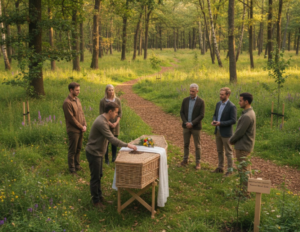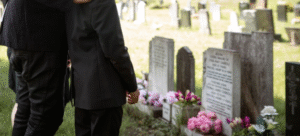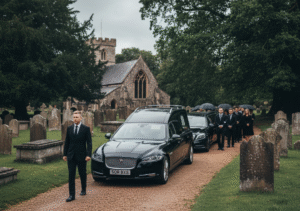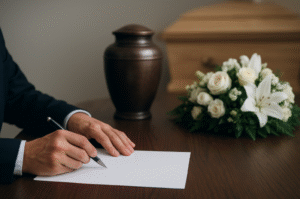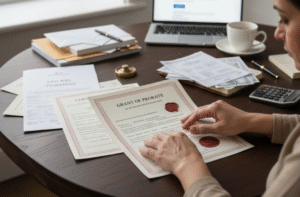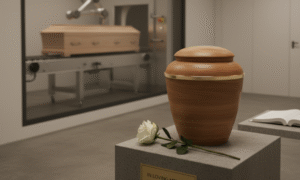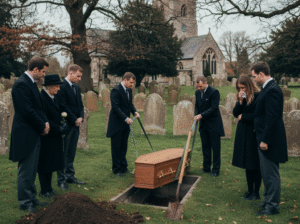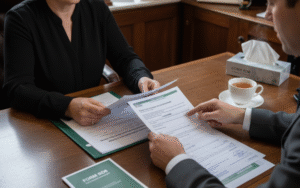Dealing with the loss of a loved one is never easy, and the practical tasks that follow can feel overwhelming. Understanding each stage of registering a death can help you navigate this essential process with confidence and clarity. Whether you’re in Leeds, Yorkshire, or farther afield, Gooding Funeral Services is here to guide you every step of the way with professional and empathetic support.
Who Can Register a Death?
Typically, a relative registers the death. If no family member is available, the following people can also register:
- Someone present at the time of death
- An occupant of the house or institution where the death occurred
- The person making funeral arrangements (not the funeral director)
The death must be registered in the district where it occurred. Gooding Funeral Services offers advice and tailored support to families in Leeds and surrounding areas throughout this process.
Timeline: When Should You Register?
- England, Wales, and Northern Ireland: Within 5 days
- Scotland: Within 8 days
Registration may be delayed if a coroner is involved, but prompt action is recommended to keep everything on track.
Step 1: Obtain the Medical Certificate
Before registration, secure the Medical Certificate of Cause of Death from the attending doctor or hospital. If the death was unexpected or unexplained, the coroner (or procurator fiscal in Scotland) may investigate, possibly resulting in a delay. Gooding Funeral Services can help liaise with the authorities if you need guidance.
Step 2: Find Your Local Register Office
Locate your nearest register office using the GOV.UK website or your local council’s website. Appointments are often required. If you’re in Leeds or West Yorkshire, Gooding Funeral Services can advise on which office to use and what you’ll need to take with you.
Step 3: Prepare the Necessary Information
Take the following details to your appointment:
- Full name and last address of the deceased
- Date and place of birth
- Occupation and, if applicable, maiden name
- Details of surviving spouse or civil partner (name, birth date, occupation)
- NHS number, if available
Also bring your own photo ID, the deceased’s birth and marriage certificates (if possible), and their NHS medical card. If you’re missing some documents, the registrar may still be able to proceed, so bring whatever information you have.
Step 4: Attend the Registration Appointment
During the appointment, the registrar will:
- Review the medical certificate
- Ask you to confirm key identifying details of the deceased
- Record the information in the official death register
Appointments usually last about 30 minutes. Gooding Funeral Services can help prepare you for what to expect and ensure you have everything you need.
Step 5: Collect Documents and Certificates
Upon completion, you’ll receive:
- A ‘Green Form’ (certificate for burial or cremation) to give to your chosen funeral director, such as Gooding Funeral Services
- Official death certificate(s), available for a fee per copy (these are needed for banks, pensions, insurance, etc.)
- Certificate of registration of death (form BD8 or 334/SI in Northern Ireland), often used for notifying government departments
Step 6: Notify Relevant Authorities
Many areas offer the “Tell Us Once” service, allowing you to notify government departments (HMRC, DWP, Passport Office, local council) in one step. If you’re unsure how to proceed, the team at Gooding Funeral Services can advise on local procedures and offer hands-on support.
Special Circumstances
- Coroner Involvement: Registration must wait until the coroner’s inquiry is complete and relevant documents are released.
- Deaths Abroad: The death is registered where it occurred; additional steps are needed if repatriation or local funeral arrangements are required. Gooding Funeral Services can provide guidance on international procedures and help with repatriation where necessary.
Frequently Asked Questions
Q. Is there a fee to register a death?
Ans. Registration is free; you pay only for death certificate copies.
Q. Can registration be done online?
Ans. No, it must be completed in person at the register office.
Q. What if you can’t register in time?
Contact the register office promptly; they may offer advice or coordinate with the coroner if there’s a delay.
Q. Can Gooding arrange the funeral after registration?
Yes. Gooding Funeral Services can step in once you have the Green Form and help you create a fitting, respectful funeral.
After Registration: Planning the Funeral
Once you have the necessary certificates, funeral arrangements can progress. Gooding Funeral Services offers a variety of funeral packages and will work closely with you to create a respectful, affordable, and fitting tribute whether you choose burial, cremation, or a personalised memorial service.
Their compassionate professionals are available 24/7, providing support not just in Leeds but across West Yorkshire, Manchester, and beyond. If you have questions about any aspect of the registration or funeral process, Gooding Funeral Services is ready to help with clear guidance and practical assistance.
Taking timely action and preparing the right documents can make a difficult time a little easier. For further guidance or support specific to your family’s needs, you can always reach out to Gooding Funeral Services, your local experts in funeral care.
Read more from our guide on funeral services in the UK.
Pages You Might Like:
Funeral directors UK, Funeral services UK, Funeral Services in Leeds, Funeral directors Leeds, Funeral Directors in Bradford, Funeral Directors Bradford, Funeral Directors Manchester, Funeral Directors Huddersfield, Funeral Services in Doncaster, Asian Funeral Services, Hindu Funeral Services, Sikh Funeral Services, Caribbean Funeral Service


